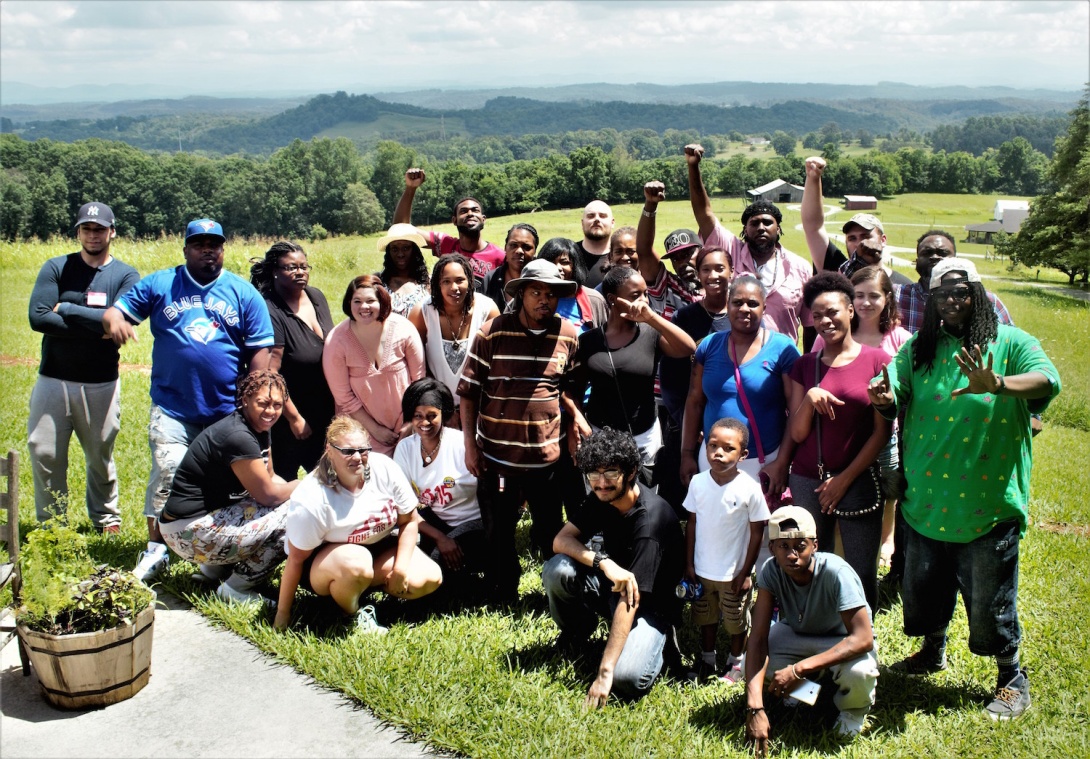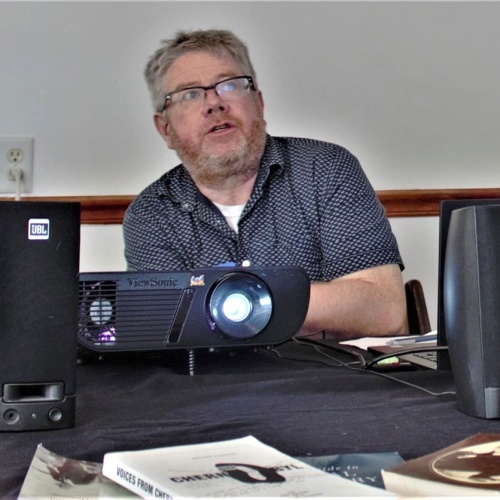Charleston workers renew region's ties to Highlander Center

Fight for $15 activists from Charleston, South Carolina, and other communities around the South recently gathered for an organizing workshop at the Highlander Center in Tennessee. (Photo by Kerry Taylor.)
Seventy years ago, a group of cigar factory workers from Charleston, South Carolina, traveled almost 500 miles to the Highlander Folk School, a leadership training school founded in East Tennessee in 1932. There, the workers introduced the school's musical director to a gospel song that had boosted their spirits during a protracted strike the previous year. Highlander staff taught the song to thousands of labor and civil rights movement activists over the years and, as its popularity spread, "We Shall Overcome" became an anthem for human rights causes worldwide. It has been sung by left-wing college students in India, anti-apartheid protesters in South Africa, and civil rights supporters from Birmingham, Alabama, to Belfast, Northern Ireland.
In the footsteps of the tobacco workers, three Charleston food and hospitality industry workers attended an educational and organizing workshop at Highlander earlier this month sponsored by Raise Up for $15. Since the summer of 2013, Raise Up has been the Southern expression of the national "Fight for $15" — the Service Employees International Union-backed movement for a livable wage and union rights for low-wage workers.
At Highlander, the Charleston workers were joined by 30 other workers — African-American fast-food workers mainly — from Birmingham; Atlanta; Richmond, Virginia; and several cities in North Carolina. Over the course of the two-day workshop, the workers, with a few organizers and guests, practiced talking union to fearful coworkers. They analyzed poems by Langston Hughes and verses from the New Testament, and learned of the history of Highlander and the long struggle for equality and economic justice in the South. They danced, partied, and they sang, both old songs and new ones.
Representatives from Repairers of the Breach — the group led by the Rev. William Barber, the architect of North Carolina's Forward Together Moral Movement — discussed possibilities for working with Raise Up members during next year's Poor People's Campaign. Organizers are planning a series of protests spotlighting poverty and economic disparities coinciding with the 50-year anniversary of the campaign spearheaded by Martin Luther King Jr. in the final months of his life.
The movement as classroom
Seated around a circle of rocking chairs in Highlander's workshop center, the workers offered analyses of "I Am Somebody," a documentary about the 1969 Charleston hospital strike. The film resonated with the audience, who recognized the demands of the black strikers as their own. The flash of recognition was even more intense for the Charleston group who tried to identify relatives in the filmed scenes of mass demonstrations and arrests. "Look at my city that I live in," Kellie Hendricks exclaimed. "We've been doing that!"
Quite literally, the 33-year old mother of three has "been doing that." During a Fight for $15 protest last November, Hendricks was arrested for impeding traffic in front of a McDonald's restaurant a few blocks from where in 1969 Charleston police rounded up hundreds of mostly women, high school students, and children for the same offense.
Hendricks drew additional historical parallels between the hospital workers' strike and the fast food workers' struggles. She described how she and her six fellow arrestees had turned to music for strength and courage during their eight-hour detention. Handcuffed and squeezed into the back of a dark and cramped police truck, the group calmed one of their comrades who had begun to hyperventilate. To help ease her fears and their own, the group filled the truck with a joyful noise, singing freedom songs and pop hits for the 30-minute drive to the county jail.
Other workers voiced skepticism regarding the film's relevance. They questioned whether the unity achieved during the 1960s was a possibility for 2017. Still others noted that the Charleston movement depended upon a small group of committed women, especially at its start. Heads nodded in recognition as they reflected on nurse Rosetta Simmons's on-screen summary of the strike experience: "We gained recognition as human beings."
Charleston's deep links to Highlander
In the years between the tobacco workers' visit and this month's workshop, hundreds more Charleston-area workers and activists have made the trek to Highlander. None made more of an impact on Highlander (and U.S. history) than Septima P. Clark, a Charleston teacher, who first visited in late June of 1954. Highlander cofounder Myles Horton was so impressed by the literacy and citizenship education work being done by Clark and her associates on the Sea Islands near Charleston that he soon invited her to join the staff. In 1961, the Citizenship School they developed was adopted by King and the Southern Christian Leadership Conference as its educational and leadership development program.
Bill Saunders of Johns Island, South Carolina, still remembers witnessing Clark's 1959 arrest at Highlander on trumped up charges that she had violated state liquor laws. Saunders fumed in anger and frustration as he watched police brutalize Clark and take her away. The bitterness has remained with Saunders, who is now 82.
But Saunders also drew great strength from his Highlander experience. "So many of the times, we thought we had the worst problem," Saunders observed in a 2011 interview. But in "meeting with people from Appalachia, poor whites … we got a chance to see how poor people were being treated, not black people or Indian, but it was about poor people."
What Highlander provided then as it does today is some critical distance from the day-to-day demands and parochial assumptions that prevent people from recognizing organizing opportunities.
Shortly after Clark's arrest, Highlander, located at the time in Monteagle, was closed by the state of Tennessee. The closure culminated a long campaign of harassment and intimidation directed at the school and its leaders. It reopened as the Highlander Research and Education Center on farmland in New Market, Tennessee, its location since 1961.
Johns Island librarian Minerva King joins Saunders in a shrinking club of people who hold memories of Highlander before its forced move. Her father J. Arthur Brown, the president of the Charleston branch of the NAACP, brought the family to Monteagle for several summers in the mid-1950s. At Highlander, King enjoyed her first experiences of "being in a racially mixed situation where everybody was equal and getting along and with one purpose, one purpose in mind." What Highlander provided then as it does today is some critical distance from the day-to-day demands and parochial assumptions that prevent people from recognizing organizing opportunities.
The Fight for $15 as Southern strategy
Nationally, the Fight for $15 has been credited for shifting the post-recession public dialogue from its emphasis on austerity to issues of low wages and poverty. In 2016, grassroots pressure from the movement has led to 25 state and local minimum wage increases covering millions of workers, according to a report by the National Employment Law Project. The fast food workers also played a key role in the mobilization that defeated President Trump's nomination of Andy Puzder for labor secretary.
Critics on the left have suggested that the Fight for $15 is a top-down and staff-driven affair bankrolled by SEIU. To be sure, the union's backing is essential. It is unclear even to insiders how the movement might lead to collective bargaining agreements or union locals of dues-paying members. From a local movement-building perspective, however, Raise Up has provided a much-needed infusion of organizing energy in Charleston, Richmond, and Greenville, North Carolina, and other places in desperate need of an organized left. With a skeleton crew of organizers and staff members, workers have won small but meaningful victories in their workplaces, securing stolen wages from McDonald's and correcting unsafe working conditions. Raise Up has also lent support to health care workers fighting for an end to low wages and racial discrimination in hospitals in Winston-Salem, North Carolina, and Charleston. In several cities in the Carolinas they have been active in the movements against racist policing. Raise Up has helped fill the vacuum created by the unwillingness of most unions and progressive foundations to invest in organizing poor workers in the South.
Through Raise Up, black and Latino workers have taken center stage in movement spaces long dominated by white and middle-class activists. The success of any kind of long-term Southern strategy will depend on the continuing development of worker-leaders like those who recently gathered at Highlander.
Tags
Kerry Taylor
Kerry Taylor is a board member of the Institute for Southern Studies, the nonprofit that publishes Facing South, and directs the Charleston Oral History Program at the Citadel: The Military College of South Carolina.
